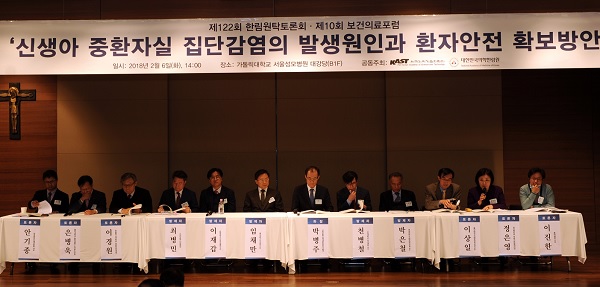Intensive care units (ICUs) in Korea need a fundamental solution, such as increasing medical workers and receiving the government’s financial support, to prevent another case of Ewha hospital incident, experts said.
Four newborns died of Citrobacter sepsis in one and a half hour on Dec. 16, at the neonatal ICU (NICU) of Ewha Womans University Medical Center.

The experts’ comments came at a forum titled, “Causes of Mass Infection at Neonatal Intensive Care Units and Securing Patient Safety,” at Seoul St. Mary’s Hospital Tuesday. The Korean Academy of Science and Technology and the National Academy of Medicine of Korea co-organized the event.
The experts emphasized that the fundamental cause of the Ewha incident was Korea’s structural problem in the medical industry, stressing that punishing doctors and nurses at Ewha hospital would not solve the problem.
Speaking on the topic of infections at Korean ICUs and improvement suggestions, Professor Lim Chae-man at the respiratory medicine department of Seoul Medical Center said hiring more medical workers and investing in ICUs are the only ways to make ICUs work properly. “Unless we don’t meet the two conditions, things will not change much,” Lim said.
The accused in the Ewha incident should not be just individual doctors, the professor said. “When the government has all the power in health insurance and does not guarantee sufficient medical charges, we’re putting too much responsibility on doctors (in managing ICUs). Blaming doctors for the incident is like missing out on a major cause,” he said.
Lee Jae-gap, a professor of infectious disease and internal medicine at Hallym University Kangnam Sacred Heart Hospital, also said people have to consider why the medical staffs at Ewha’s NICU had to take care of many babies at the same time when they search for the cause of the fatal infection.
“We have to examine why nurses were so busy that they injected the nutritional supplements from storage, and ask whether the incident would have happened if it had occurred during weekdays and if the NICU had enough workforce. If you blame the workers who were forced to work in an overstretched hospital, who would work as a nurse?” Lee asked.
If the government does not set up specific long-term measures to improve the dire situation of ICUs, medical errors can occur continuously, he went on to say. “Infection management is a fight for sustainability. The government should foresee at least three decades for this area. The government should not adopt stopgap measures limited to the Ewha case, just like it did when the nation was hit by MERS (Middle East Respiratory Syndrome),” Lee added.
Choi Byung-min, director of Korea University Ansan Hospital and pediatrics professor, said NICUs need the government’s support to boost the medical workforce.
According to Choi, 82.5 percent, or 80 NICUs, of the total 97 NICUs in Korea have two specialists or fewer. Forty-three NICUs, or 44.3 percent, have only one specialist. One specialist at NICUs saw 9.7 patients on average. Some NICU specialists had to care for up to 30.9 patients.
Only 30 percent of the NICUs had the first-grade ratio of beds to nurses at 0.75 or less to 1. About half, or 46.5 percent, had the second-grade ratio at 0.75-1 to 1. That is, nurses at first-grade NICUs took care of 3.4 newborns. Those at second-grade NICUs cared for 4.5 babies.
“NICUs are on the verge of collapse. If such situation continues, more physicians and nurses will avoid working at NICUs. Then, the workforce issue will worsen. We urgently need the government’s support to raise workforce at NICUs,” Choi said.
Not only the medical community but patient groups urged government measures to solve the issue of medical staff shortage.
Ahn Ki-jong, head of the Korea Alliance of Patients Organization, said the Ewha incident is a lesson to resolve the workforce issue at NICUs.
“The government should set the limit of the NICU workforce by law and raise reimbursements to the level of those in advanced countries. It should take strong actions to hospitals that do not follow the rules, forcing them to reduce the number of beds or to close wards,” he said.
To enhance infection management and patient safety, the government should prioritize nurturing quality specialists and nurses, Ahn added, “Raising reimbursements does not necessarily mean hospitals can hire highly-skilled specialists and nurses. The government and the medical community should come up with urgent measures to raise professionals who can commit to working at NICUs,” he added.
The Ministry of Health and Welfare said it could not help but express “shock” over the Ewha incident and promised to prevent such case from happening again.
“It was very shocking to see such infection incident occurred at Ewha hospital which was not only certified by Korea Institute for Healthcare Accreditation but by JCI (Joint Commission International),” said Jeong Eun-young, head of the healthcare institution policy division at the ministry. “The bereaved family asked the government to prepare measures to prevent another incident so that the sacrifices of the children end in vain. As soon as the police investigation is over, the ministry will take actions in earnest."
“We humbly accept the criticism that the health-welfare ministry was responsible for the incident and that reimbursements for NICUs were insufficient. We will listen to the opinions of experts through a task force, review them thoroughly, and establish long-term measures,” she added.
Jeong also promised that the government would actively communicate with experts to make the right policies.

